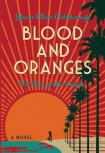Blood and Oranges, James Goldsborough [spicy books to read txt] 📗

- Author: James Goldsborough
Book online «Blood and Oranges, James Goldsborough [spicy books to read txt] 📗». Author James Goldsborough
The oil wells on the beaches came down. The movie industry had never been stronger, and the mob decamped from Los Angeles to Las Vegas (where air-conditioning had arrived) for legalized gambling and off-track betting. Palm Springs was a pleasant two-hour drive away where a few thousand dollars would buy you a stucco and a date ranch. A federal highway bill passed that would make a mess of the city, but that was still a few years out. The interurban rail system that once was the envy of the nation was demolished, but Eisenhower was promising to bring the demolishers to justice. The water arriving from the Owens and Colorado Rivers, the water that built Los Angeles, was no longer sufficient but a state water project would be passed to bring water from Northern California, where the water was, to Southern California, where the people were.
It was a period of stability and equilibrium. It would have taken a person of diabolical imagination to foresee the chaos that was coming: the smog, traffic, trash, crime, riots, drugs, viruses, and homelessness; the building frenzy that would destroy hillsides and mountains and guarantee the revenge of summer fires and winter floods; the Big One that finally struck—but was it really the Big One when the epicenter was in the Valley and only fifty-seven people died? In the fifties, people didn’t know about any of that. They didn’t make much money, but nothing cost much either. Doctors and dentists made no more than anyone else, hamburgers were nineteen cents and gasoline twenty-nine cents a gallon. Movies were a quarter. You could buy a prewar stucco in West Hollywood for fifteen thousand dollars or pay the same for a new tract house in Westchester. Free of oil wells, beaches were again for sunning and swimming. The Dodgers arrived from Brooklyn and the Rams still played in the Coliseum. The fifties in Los Angeles was as good as it gets.
Lizzie had not forgotten her inheritance. When Eddie’s estate was probated, taxes paid and assets distributed, Security Bank and Trust set up a trust in her name with a value just under $20 million—not counting the Venice oil fields. What to do with it? She’d worked for the Times for twenty years, been reporter, editor, reporter, editor, and reporter again. She had no intention of stopping writing. She’d filled pages of private notebooks—thoughts and profiles and sketches back to her days writing for Miss Adelaide Nevin. She had material ready for a Pitts-Callender book when an idea for a novel struck her: a corporation takes over a town, destroys what has been built up over decades, ruins lives and gets away free. She showed Joe the outline and watched him take a book from the shelves, The Octopus, by Frank Norris. She read the book and tore up her outline. She would stick to nonfiction.
Saturday morning and they were in their garden. They had hangovers from a few too many the night before with Maggie and Terry at Lawry’s on La Cienega, but coffee and Seville oranges (with sugar) in sunny chairs and the green freedom of the garden without their son was restoring them. Robby had spent the night at a friend’s house and was due back anytime. They talked a while about what to do with their son. His teachers said he was two years ahead of his classmates and ready for high school—academically but not emotionally. He was twelve years old and a handful. They didn’t mind at all when he slept over with friends.
“You know I didn’t mean to discourage you the other day,” Joe said. “Frank Norris had a good idea but was no good at characterization. The subject can be done better.”
“Let’s see how the Pacific Electric trial turns out first.”
“Why? If it’s a novel, you can make it turn out as you like. Use your imagination.”
He liked the way she looked in the morning, something about her short, mussed, sandy hair being provocative. She was aging well; or maybe it was because she was a dozen years younger, and he was aging faster. He liked making love to her Saturday mornings when she wasn’t rushing off to work. She’d thrown on jeans and a shirt to sit with him in the privacy of their garden, read the newspaper and talk.
“Not sure I have the imagination for novels.”
“You never know till you try.”
“Sure you do. You, for example, are always making things up, composing stories in your head, inventing dialogue. I just watch and listen and take notes.”
They fell silent. He watched her reading the paper, thinking he loved her more than he thought he could ever love any person. But he had something else on his mind. She glanced up and saw the look that said something was coming that she didn’t really want to hear.
“I’ve never told you this before, but as a newspaper the Times stinks.”
She didn’t say a word.
She knew it, of course, but that made it no easier to hear. She’d belonged to the Los Angeles Times for two decades, the only professional life she’d known. She’d given it all she had, put her life on the line and wasn’t yet done. Joe’s arrow hit its mark and it showed in her face and her silence. He wanted her to quit the newspaper and write books. He worried about her always being on the frontlines of stories that put her in danger.
“That doesn’t mean you stink, hon,” he said, trying to recover, “just that the Times isn’t good enough for you. You deserve better. So does this city.”
She levelled angry eyes at him. “This is Los Angeles, Joe, not your





Comments (0)